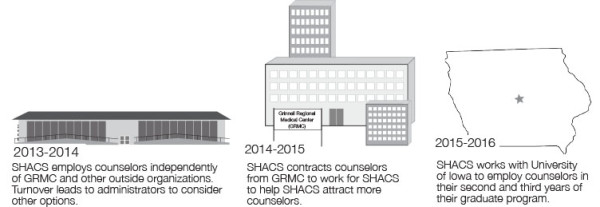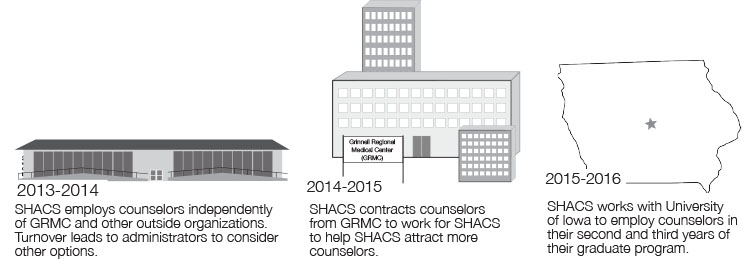Grinnell College’s Student Health and Counseling Services (SHACS) will serve as a job site for counselors in University of Iowa’s Clinical Psychology Doctoral Program beginning in the fall 2015 semester, and SHACS will hire a psychologist who will oversee new counselors and also fulfill appointments with Grinnell students, according to a Special Campus Memo on February 19, 2015.
In previous years, SHACS has hired psychologists on its own. When counselors began leaving for various personal reasons, SHACS leaders adjusted by developing a relationship with Grinnell Regional Medical Center (GRMC). Under a contract that came into effect for the 2014-2015 school year, SHACS has been employing GRMC counselors to meet students’ needs. Because of GRMC’s growing struggle in recruiting counselors due to the statewide shortage of mental health professionals, SHACS leaders are developing this third option with the University of Iowa.
By the time they see Grinnell College students, the University of Iowa doctoral students will have completed a year of supervised counseling at the University of Iowa’s mental health care center and will continue to be supervised by the new SHACS psychologist, whom Vice President of Student Affairs Andrea Conner hopes will begin work by July 1. These doctoral students will bring SHACS to the initial goal of offering students the equivalent of three full-time employees, according to the memo.
“We have been discussing this option for the past few months due to the local and nationwide shortage of mental health
therapists, which has hindered the hiring process,” Conner wrote in an email to The S&B. “We were brainstorming ways to increase our candidate pool and this idea arose.”
If SHACS cannot hire a head of mental health and psychologist, Deb Shill, the current director of SHACS, will continue to oversee both mental and physical health at SHACS. However, Vice President for Strategic Planning Angela Voos stated that she hopes that these new connections to the University of Iowa will help with recruitment for the managerial position.
SGA Vice President for Student Affairs Iulia Iordache ’15 has been meeting with Shill, Voos, Conner and other members of the administration about SHACS throughout her term.
“I think everyone’s on the same page: the students want more services, we need more services,” Iordache said. “We definitely need more stability in the services that we offer, too, but I think that there’s a disconnect between what the students understand that the school can and is able to offer.”
According to Iordache, though the school has better financial incentives to offer potential counselors, it is difficult to advertise these offers to potential candidates.
On Tuesday, Feb. 24, the student group Active Minds invited Voos and Kate Walker, the Treasurer and Vice President for Finance, to answer questions students may have about the state of SHACS. At the meeting, students discussed reservations about the new system of SHACS, particularly that it feels like another temporary solution.
“The main issues are continuity of care—people seeing different people at a time, stability … who’s going to be there when you need them and bench depth. Do we have enough resources from enough places so that we can backstop the scarcity,” Voos said at the meeting.
Members of Active Minds have already met with Dean of Religious Life Deanna Shorb and Associate Chaplain Rob Cabelli and will continue to invite Shill and Conner to speak at future meetings. Following the group’s series of guest speakers, they will meet to discuss if they want to take a more aggressive approach.
“I think we have ideals in mind, and if they’re not being met fast enough, we do plan to talk about taking action,” said Active Minds Outreach Chair Jennifer Dysart ’15.
Dysart said that Active Minds is specifically looking for changes to the SHACS website and an introduction of an FAQ page to be posted on the site, which was also discussed at Tuesday’s meeting.
Though some have expressed dissatisfaction with the GRMC contract, SHACS will continue partnering with GRMC, while also continuing to hire counselors independently as part of a three-pronged approach to deal with students’ demands for mental health care.
“We have been very willing to listen to suggestions and ideas from students as we move forward in this process,” Conner wrote. “College leaders believe that a continued collaboration with GRMC (along with other partnerships) is a benefit to the College and the community.”
























































